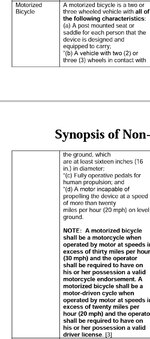I think the bootlicker comment is that you just automatically accept what PFBs is telling you...which is kind of true. Like many you seem to think 3-class is associated with trail access somehow.
Is PA using the so called "model legislation" from PFBs or something else. I haven't looked up their state law yet. Also want to add that your trail access concerns should be primarily solves by the recent DOI order which covers everything but national forests and state parts. In reality of a compliant ebike was just considered a bike for use there would have never have been any trail access issues.
Let me ask you a question as you say you educated yourself on the CPSC laws. Did you ever ask any of the local politicians to read HR727 and get their opinion on what was intended in 2002. It's states clearly that a "low speed electric bicycle" is not a motor vehicle and is defined as just a bike and safety regulated as a bike. If "use" regulated as a bike then it all works but my guess is you didn't have them read anything (I honestly believe the best way to get everyone on the same page is to first start with everyone understand the bike regulatory laws, how HR727 came about (taking ebikes away from NHTSA who had them defined as motor vehicle), and then understanding how 3-class impacts interstate commerce (that's why I suggest some review of the CPSC history and the preemptive power it does have).
Don't assume 3-class solves anything with riders of non-compliant ebikes/off-road/mopeds as that is a mutually exclusive issue.
Another disingenuous reply. I've written dozens of times on these forums that there's a lot I don't like about the 3 Class law, that it doesn't legalize off road use, as a matter of fact the only way it addresses the off road issue it that it leaves it up to local goverment. What it has done is give regulators an acceptable option in class 1. No matter what you do or say, land managers and regulators will not accept a throttle. If all ebikes fall under the same category, ebikes will be banned on all off road venues. I've also written many, many times how disappointed I am with PFB. When we asked for help from them on paths and trails they said they didn't have the resources to help. They don't get involved with any off road use.
Off road includes:
Urban paths
Bike paths
Hike and bike trails
Canal towpaths
Bike lanes (in many locales)
Sidewalks
Rail trails
Single tracks
I have read aloud HR727 at meetings with regulators. I learned the feds can't control access. That from legal experts neither pro or con ebikes. You couldn't be more wrong about state and local rights. I'll repost:
These are state's rights issues. The Supreme Court almost always sides with the states rights for use regulations. The last thing any of us would want is a bunch of beurocrats in DC to control bike paths and trails in our own back yards. Picking one state like Oregon and saying they don't have a problem is silly. Oregonians are regulating Oregonians. As it should be. States with the 3 Class law can say the same.
There's an assumption here that the states that do not currently have the 3 class law would be okay with the CPSC controlling all this. Those state's AG will also sign onto any state's rights law suit in federal court. No state in the country will want to give up regulatory control of their own property. None. Read some of the Supreme Court's rulings on use regulations and state's rights.
This is not a transportation issue; the CPSC overstepped their authority when they took this issue from the USDOT. Even if it was a transportation issue, state and local governments have regulatory use control of state, county and township road use. They set the speed, weight, access, noise and every other issue. The Feds have nothing to do with it, other than to say what a safe vehicle is. Even then local governments can grant exceptions. I live in rural farm country and I see farm trucks and trailers more than 50 years old. They would never pass federal regs to be road worthy, some don't even have seatbelts. There they are, tagged and registered on the road.
I don't care about the few diehards proposing this; I care about the newcomers to ebikes. I care about land managers and regulators that research the issue and stumble across these forums. I've had to answer a lot of questions from regulators about illegal ebikes and how they are used.
Addendum, I drive a class 2 pickup truck in Pennsylvania. I guess I can tell the state they can't require me to pay for a class 2 registration or require me to display a class 2 sticker because the feds don't require it. I wouldn't be driving for long. A state has a right to regulate use.



